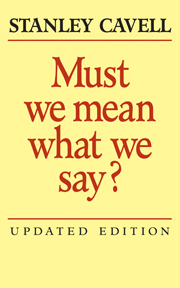Book contents
- Frontmatter
- Contents
- Permissions
- Acknowledgments
- Preface to Updated Edition of Must We Mean What We Say?
- Foreword: An Audience for Philosophy
- I Must We Mean What We Say?
- II The Availability of Wittgenstein's Later Philosophy
- III Aesthetic Problems of Modern Philosophy
- IV Austin at Criticism
- V Ending the Waiting Game
- VI Kierkegaard's
- VII Music Discomposed
- VIII A Matter of Meaning It
- IX Knowing and Acknowledging
- X The Avoidance of Love
- Thematic Index
- Index of Names
VI - Kierkegaard's
On Authority and Revelation
Published online by Cambridge University Press: 05 June 2012
- Frontmatter
- Contents
- Permissions
- Acknowledgments
- Preface to Updated Edition of Must We Mean What We Say?
- Foreword: An Audience for Philosophy
- I Must We Mean What We Say?
- II The Availability of Wittgenstein's Later Philosophy
- III Aesthetic Problems of Modern Philosophy
- IV Austin at Criticism
- V Ending the Waiting Game
- VI Kierkegaard's
- VII Music Discomposed
- VIII A Matter of Meaning It
- IX Knowing and Acknowledging
- X The Avoidance of Love
- Thematic Index
- Index of Names
Summary
“I myself perceive only too well,” Kierkegaard says in beginning a second Preface to his Cycle of Ethico-Religious Essays, “how obvious is the objection and how much there is in it, against writing such a big book dealing in a certain sense with Magister Adler.” His first answer to this objection is just that the book is “about” Adler only in a certain sense, the sense, namely, in which he is a Phenomenon, a transparence through which the age is caught. But that is scarcely a serious answer, because what the objection must mean is: Why use the man Adler in this way? And Kierkegaard has an answer to this as well: it enabled him to accomplish something which “perhaps it was important for our age that [I] should accomplish and which could be accomplished in no other way.” This is not a moral defense for his treatment; it does not, for example, undertake to show that an action which on the surface, or viewed one way, appears callous or wanton, is nevertheless justified or anyway excusable. Kierkegaard goes on to offer what looks like an aesthetic defense of his treatment of Adler—“without him [I] could not have given my presentation the liveliness and the ironical tension it now has.” This moral shock is succeeded by another as we realize that the presentation in question is not offered for its literary merit, but for its value as a case study; it is the justification of a surgeon, whose right to cut into people is based on his skill and credentials and whose right to present his cases to others is based on his office and on the obligation to transmit his knowledge to his peers.
- Type
- Chapter
- Information
- Must We Mean What We Say?A Book of Essays, pp. 163 - 179Publisher: Cambridge University PressPrint publication year: 2002
- 2
- Cited by



